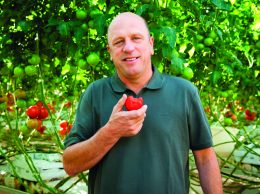Opinion: Sorting the ins and outs of new Ventura County cannabis law
By Amy Steinfeld and Jack Ucciferri
Ventura County was among nearly three dozen California jurisdictions to amend its cannabis policies as a result of last month’s voter initiatives. Ventura residents approved Measure O, which will open up portions of the county to commercial cannabis businesses, including cultivation, processing and distribution.
At this time, no retail dispensaries will be allowed within the unincorporated county, but cannabis growers will have access to the thriving Los Angeles retail market, as well as retailers in certain Ventura County cities. Measure O places strict limitations on where cannabis can be grown but represents a significant opportunity for select greenhouse owners and farmers looking to diversify.
Cultivation Caveats
Measure O will limit cannabis cultivation operations to existing permanent greenhouses or indoor facilities, and cap total county acreage at 500 acres of mature canopy (flowering plants) plus an additional 100 acres for nursery cultivation. Ancillary processing (drying and trimming) and distribution will also be allowed on-site. By comparison, Ventura’s neighbor, Santa Barbara County, capped greenhouse cannabis cultivation at 186 acres in Carpinteria’s coastal zone.
Beyond forbidding outdoor cultivation, cannabis activities are restricted to properties zoned as Agricultural Exclusive or M2 & M3 Industrial, and must be further than 1,200 feet from schools, day cares, youth and drug rehab centers, parks, and residential neighborhoods. This applies to all commercial cannabis activities, not just cultivation, in an attempt to avoid neighborhood conflicts.
Finding the Right Spot
In order to apply for local authorization, an applicant must prove they own or lease a greenhouse within the proper zone. Because cannabis policies are still evolving at the local, state and federal levels, cannabis leases are very specialized legal documents.
A proper cannabis lease differs from a traditional commercial lease in a number of ways, possibly including, among other things, limitations on tenant subleasing rights, allocation of unique waste disposal, security and tenant improvements, and creative financing and payment options. Whether you’re a commercial real estate owner or potential lessee, it’s important to retain an expert who understands the intricacies of the cannabis industry.
Licensing: A Two-Step Process
Getting a cannabis cultivation business up and running in Ventura County will require local and state authorization. Local authorization for all commercial cannabis businesses, not just cultivators, includes obtaining an annual business license and a zoning clearance from the county. Business licenses will be renewed annually and applications will be accepted starting Jan. 1, 2021.
Applicants for a zoning clearance must submit an energy conservation plan, site security plan and odor control plan. The land use process in Ventura County is more streamlined than Santa Barbara County’s notoriously difficult process, as it specifically exempts zoning clearance applications from environmental review and public hearings, which will save growers significant time and resources.
Commercial cannabis businesses must also obtain a state license from the appropriate state authority. California is in the process of streamlining its cannabis agencies to combine all licensing and compliance activities into one department, but until that process is completed, cultivators will remain regulated by CalCannabis Cultivation Licensing, a division of the California Department of Food and Agriculture.
The Upside
Ventura County is an agricultural powerhouse with the resources and experience to grow this very popular plant and compete in this space. Because cannabis is a rapidly expanding industry, Ventura County also stands to benefit in the form of significant new tax revenue. Such revenues are more important than ever as the COVID-19 pandemic has heavily impacted other sources of local tax revenue—think anything related to the local tourism and hospitality sectors.
It’s estimated that commercial cannabis will raise $2.29 million per year in local tax revenue for the county’s general fund, which can be used for any purpose.
Nationally, the November 2020 election highlighted that cannabis is no longer a partisan issue and is here to stay, and expand. Public sentiment has finally coalesced around legalizing cannabis, which was evidenced by five new states voting to legalize some form of cannabis. As a result of this clean sweep, 1 in 3 Americans now live in a state where they can access legal recreational cannabis.
Adding further momentum to the cannabis industry nationally, President-elect Joe Biden will nominate California Attorney General Xavier Becerra to be the next secretary of Health and Human Services. This cabinet position oversees the Food and Drug Administration, so Becerra’s strong pro-cannabis record signals that the Biden administration will support a common-sense approach to federal cannabis policy, including clarifying the status and legality of CBD for human consumption.
Measure O ensures Ventura County will be a relative “first mover” and establish itself as part of California’s growing cannabis industry, and will position its farmers to compete nationally when the plant is legalized federally, which is likely in three to four years.
• Amy Steinfeld is an attorney at Brownstein Hyatt Farber Schreck and serves as office managing partner for the Santa Barbara office, as well as co-chair of the firm’s cannabis and industrial hemp industry group. Jack Ucciferri is a law clerk in Brownstein’s Santa Barbara office and a member of the firm’s cannabis and industrial hemp industry group.











